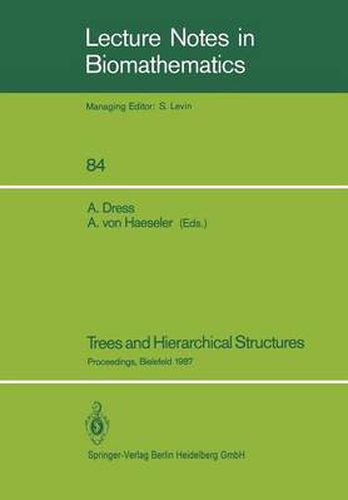Readings Newsletter
Become a Readings Member to make your shopping experience even easier.
Sign in or sign up for free!
You’re not far away from qualifying for FREE standard shipping within Australia
You’ve qualified for FREE standard shipping within Australia
The cart is loading…






This title is printed to order. This book may have been self-published. If so, we cannot guarantee the quality of the content. In the main most books will have gone through the editing process however some may not. We therefore suggest that you be aware of this before ordering this book. If in doubt check either the author or publisher’s details as we are unable to accept any returns unless they are faulty. Please contact us if you have any questions.
The non-transitivity of similarity relations is the main problem encountered when - as in taxonomic studies in biology - one wants to base classification schemes on observed similarities and dissimilarities. While recent advances in molecular biology give rise to new and rather abstract data structures which can easily be used as input for automatic classification procedures we are still very much in need of a better and deeper understanding of the many delicate points which need consideration once (semi-)automatic classification procedures are applied to biological or other data. The papers collected in this volume are devoted to precisely this problem. They study various theoretical aspects of three reconstruction methods in biology, and psychology, discuss their value in specific biological contexts, apply tree-like recursion networks in chess programming and indicate a conceptual framework for studying cluster analysis from a purely mathematical point of view.
$9.00 standard shipping within Australia
FREE standard shipping within Australia for orders over $100.00
Express & International shipping calculated at checkout
Stock availability can be subject to change without notice. We recommend calling the shop or contacting our online team to check availability of low stock items. Please see our Shopping Online page for more details.
This title is printed to order. This book may have been self-published. If so, we cannot guarantee the quality of the content. In the main most books will have gone through the editing process however some may not. We therefore suggest that you be aware of this before ordering this book. If in doubt check either the author or publisher’s details as we are unable to accept any returns unless they are faulty. Please contact us if you have any questions.
The non-transitivity of similarity relations is the main problem encountered when - as in taxonomic studies in biology - one wants to base classification schemes on observed similarities and dissimilarities. While recent advances in molecular biology give rise to new and rather abstract data structures which can easily be used as input for automatic classification procedures we are still very much in need of a better and deeper understanding of the many delicate points which need consideration once (semi-)automatic classification procedures are applied to biological or other data. The papers collected in this volume are devoted to precisely this problem. They study various theoretical aspects of three reconstruction methods in biology, and psychology, discuss their value in specific biological contexts, apply tree-like recursion networks in chess programming and indicate a conceptual framework for studying cluster analysis from a purely mathematical point of view.